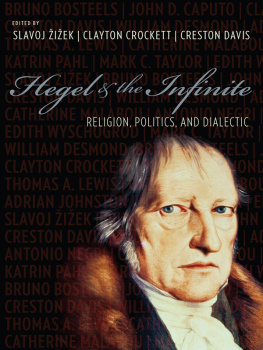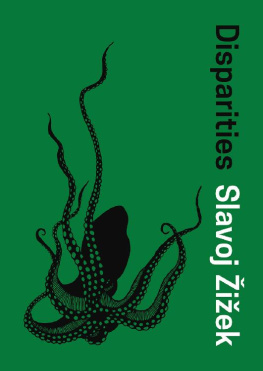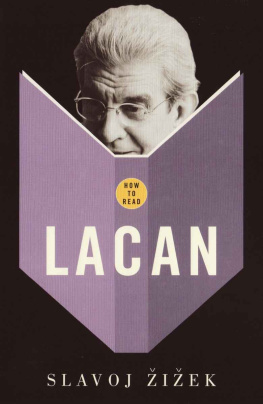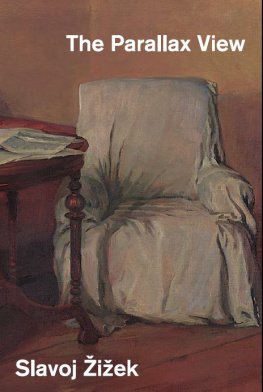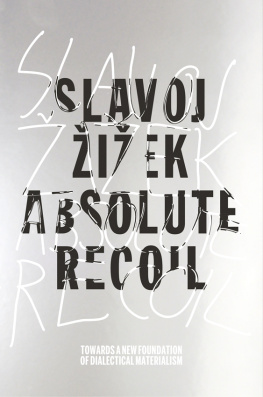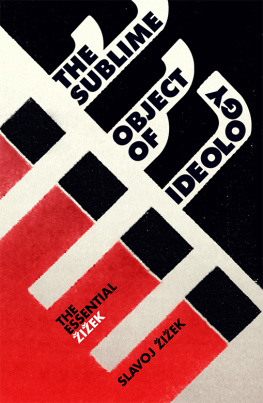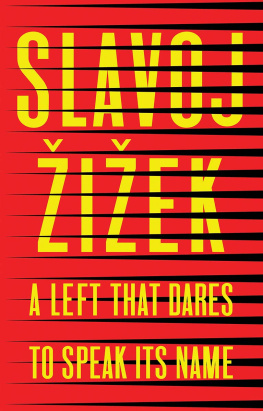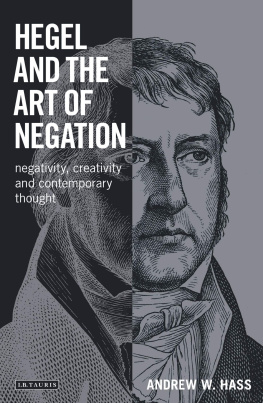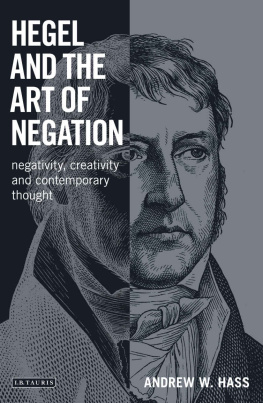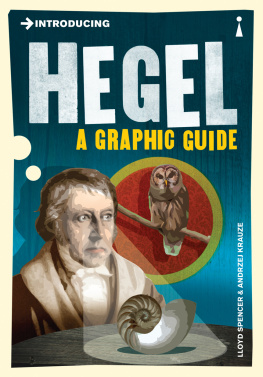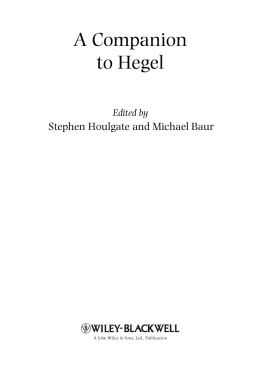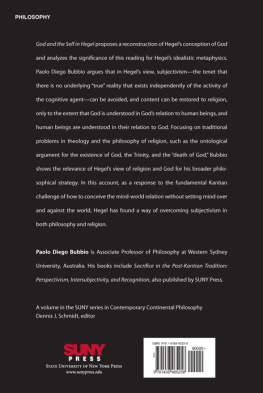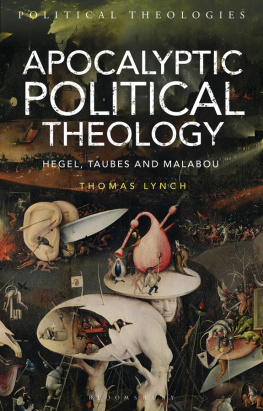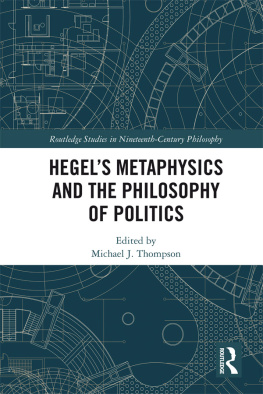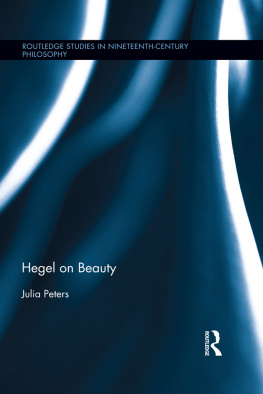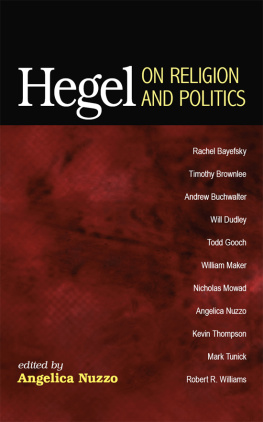Hegel & the Infinite
INSURRECTIONS: CRITICAL STUDIES IN RELIGION, POLITICS, AND CULTURE
INSURRECTIONS: CRITICAL STUDIES IN RELIGION, POLITICS, AND CULTURE
Slavoj iek, Clayton Crockett, Creston Davis, Jeffrey W. Robbins, editors
The intersection of religion, politics, and culture is one of the most discussed areas in theory today. It also has the deepest and most wide-ranging impact on the world. Insurrections: Critical Studies in Religion, Politics, and Culture will bring the tools of philosophy and critical theory to the political implications of the religious turn. The series will address a range of religious traditions and political viewpoints in the United States, Europe, and other parts of the world. Without advocating any specific religious or theological stance, the series aims nonetheless to be faithful to the radical emancipatory potential of religion.
After the Death of God, John D. Caputo and Gianni Vattimo, edited by Jeffrey W. Robbins
The Politics of Postsecular Religion: Mourning Secular Futures, Ananda Abeysekara
Nietzsche and Levinas: After the Death of a Certain God, edited by Jill Stauffer and Bettina Bergo
Strange Wonder: The Closure of Metaphysics and the Opening of Awe, Mary-Jane Rubenstein
Religion and the Specter of the West: Sikhism, India, Postcoloniality, and the Politics of Translation, Arvind Mandair
Plasticity at the Dusk of Writing: Dialectic, Destruction, Deconstruction, Catherine Malabou
Anatheism: Returning to God After God, Richard Kearney
Rage and Time, Peter Sloterdijk
Radical Political Theology: Religion and Politics After Liberalism, Clayton Crockett
Radical Democracy and Political Theology, Jeffrey W. Robbins
EDITED BY
SLAVOJ IEK | CLAYTON CROCKETT | CRESTON DAVIS
Hegel & the Infinite
RELIGION, POLITICS, AND DIALECTIC


Columbia University Press
Publishers Since 1893
New York Chichester, West Sussex
cup.columbia.edu
Copyright 2011 Columbia University Press
All rights reserved
E-ISBN 978-0-231-51287-9
Library of Congress Cataloging-in-Publication Data
Hegel and the infinite : religion, politics, and dialectic / edited by Slavoj
Zizek, Clayton Crockett, and Creston Davis.
p. cm. -- (Insurrections)
Includes index.
ISBN 978-0-231-14334-9 (cloth : alk. paper)
ISBN 978-0-231-14335-6 (pbk. : alk. paper)
ISBN 978-0-231-51287-9 (e-book)
1. Hegel, Georg Wilhelm Friedrich, 17701831. I. iek, Slavoj.
II. Crockett, Clayton, 1969 III. Davis, Creston. IV. Title.
B2948.H31787 2011
193dc22
2010045029
A Columbia University Press E-book.
CUP would be pleased to hear about your reading experience with this e-book at .
References to Internet Web sites (URLs) were accurate at the time of writing. Neither the editors nor Columbia University Press is responsible for URLs that may have expired or changed since the manuscript was prepared.
To KXMM (the King College Mountain Men)
and James C. Livingston, and to the future readers of Hegel
CONTENTS
SLAVOJ IEK
CLAYTON CROCKETT AND CRESTON DAVIS
CATHERINE MALABOU
ANTONIO NEGRI
JOHN D. CAPUTO
BRUNO BOSTEELS
MARK C. TAYLOR
WILLIAM DESMOND
KATRIN PAHL
ADRIAN JOHNSTON
EDITH WYSCHOGROD
THOMAS A. LEWIS
SLAVOJ IEK
Hegels Century
SLAVOJ IEK
T he ultimate anti-Hegelian argument is the very fact of the post-Hegelian break: what even the most fanatical partisan of Hegel cannot deny is that something changed after Hegel, that a new era of thought began that can no longer be accounted for in the Hegelian terms of absolute conceptual mediation. This rupture occurs in different guises, from Schellings assertion of the abyss of prelogical Will (vulgarized later by Schopenhauer) and Kierkegaards insistence on the uniqueness of faith and subjectivity, through Marxs assertion of actual socioeconomic life process and the full autonomization of mathematicized natural sciences, up to Freuds motif of the death-drive as a repetition that persists beyond all dialectical mediation. Something happened here; there is a clear break between before and after. And while one can argue that Hegel already announces this break, that he is the last of idealist metaphysicians and the first of postmetaphysical historicists, one cannot really be a Hegelian after this break. Hegelianism has lost its innocence forever. To act like a full Hegelian today is the same as to write tonal music after the Schnberg revolution.
The predominate Hegelian strategy that is emerging as a reaction to this scarecrow image of Hegel as the Absolute Idealist is the deflated image of Hegel freed of ontological-metaphysical commitments, reduced to a general theory of discourse, of possibilities of argumentation. This approach is best exemplified by so-called Pittsburgh Hegelians (Brandom, McDowell): no wonder Habermas praises Brandom, since Habermas also avoids directly approaching the big ontological question (are humans really a subspecies of animals? is Darwinism true?), the question of God or Nature, of idealism or materialism. It would be easy to prove that Habermass neo-Kantian avoiding of ontological commitment is in itself necessarily ambiguous: while the neo-Kantians treat naturalism as the obscene secret not to be publicly admitted (of course man developed from nature, of course Darwin was right), this obscure secret is a lie; it covers up the idealist form of thought, the a priori transcendentalism of communication that cannot be deduced from natural being. The truth is here in the form: as with Marxs old example of royalists in the republican form, Habermasians secretly think they are really materialists, while the truth is in the idealist form of their thinking.
Such a deflated image of Hegel is not enough. One should approach the post-Hegelian break in more direct terms. True, there is a break, but in this break Hegel is the vanishing mediator between its before and its after, between traditional metaphysics and postmetaphysical nineteenth- and twentieth-century thought. That is to say, something happens in Hegel, a breakthrough into a unique dimension of thought, which is obliterated, rendered invisible in its true dimension, by the postmetaphysical thought. This obliteration leaves an empty space, which has to be filled in so that the continuity of the development of philosophy can be reestablished. Filled in with what? The index of this obliteration is the ridiculous image of Hegel as the absurd absolute idealist who pretended to know everything, to possess Absolute Knowledge, to read the mind of God, to deduce all of reality out of the self-movement of (his) Mindthe image which is an exemplary case of what Freud called Deck-Erinnerung (screen memory), a fantasy formation destined to cover up a traumatic truth. In this sense, the post-Hegelian turn to concrete reality, irreducible to notional mediation should rather be read as the desperate posthumous revenge of metaphysics, as an attempt to reinstall metaphysics, although in the inverted form of the primacy of concrete reality.
In what, then, resides Hegels uniqueness? Hegels thought stands for the moment of passage between philosophy and masters discourse, the philosophy of the One that totalizes the multiplicity and antiphilosophy, which asserts the Real that escapes the grasp of the One. On the one hand, he clearly breaks with the metaphysical logic of counting-for-One; on the other hand, he does not allow for any excess external to the field of notional representations. For Hegel, totalization-in-One always fails, the One is always already in excess with regard to itself, it is itself the subversion of what it purports to achieve; and it is this tension internal to the One, this Twoness, which makes the One One and simultaneously dislocates it, it is this tension which is the movement of the dialectical process. In other words, Hegel effectively denies that there is no Real external to the network of notional representations (which is why he is regularly misread as an absolute idealist in the sense of the self-enclosed circle of the totality of the Notion). However, the Real does not disappear here in the global self-relating play of symbolic representations; it returns with a vengeance as the immanent gap, the obstacle, on account of which representations cannot ever totalize themselves, on account of which they are non-All.
Next page
